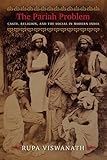The Pariah problem : caste, religion, and the social in modern India / Rupa Viswanath.
Material type: TextSeries: Cultures of historyPublisher: New York : Columbia University Press, [2014]Copyright date: ©2014Description: 1 online resource (xviii, 396 pages)Content type:
TextSeries: Cultures of historyPublisher: New York : Columbia University Press, [2014]Copyright date: ©2014Description: 1 online resource (xviii, 396 pages)Content type: - text
- computer
- online resource
- 9780231537506
- 0231537506
- Pariahs -- History
- Pariahs -- Social conditions
- Caste -- India -- History
- India -- Social conditions
- India -- History
- Parias -- Histoire
- Parias -- Conditions sociales
- Castes -- Inde -- Histoire
- Inde -- Conditions sociales
- Inde -- Histoire
- SOCIAL SCIENCE -- Discrimination & Race Relations
- SOCIAL SCIENCE -- Minority Studies
- POLITICAL SCIENCE -- Public Policy -- Social Services & Welfare
- Caste
- Pariahs
- Social conditions
- India
- 305.5 305.5/6880954
- DS432.P25 V57 2014eb
| Item type | Home library | Collection | Call number | Materials specified | Status | Date due | Barcode | |
|---|---|---|---|---|---|---|---|---|
 Electronic-Books
Electronic-Books
|
OPJGU Sonepat- Campus | E-Books EBSCO | Available |
"Once known as 'Pariahs, ' Dalits are primarily descendants of unfree agrarian laborers. They belong to India's lowest castes, face overwhelming poverty and discrimination, and continue to be a source of public anxiety. Drawing on a wealth of previously untapped sources, this book follows the conception and evolution of the 'Pariah problem' in public consciousness in the 1890s. It shows how high-caste landlords, state officials, and well-intentioned missionaries conceived of Dalit oppression and prevented substantive solutions to the 'Pariah Problem' with consequences that continue to be felt today. The book begins with a description of the everyday lives of Dalit laborers in the 1890s and highlights the systematic efforts made by the state and Indian elites to protect Indian slavery from public scrutiny. Protestant missionaries were the first non-Dalits to draw attention to their plight. However, their vision of the Pariahs' suffering as a result of Hindu religious prejudice obscured the fact that the entire agrarian political-economic system depended on Pariah labor. The Indian public as well as colonial officials came to share a view compatible with missionary explanations, which meant all subsequent welfare efforts directed at Dalits focused on religious and social transformation rather than on structural reform. Methodologically, theoretically, and empirically, this book breaks new ground to demonstrate how events in the early decades of state-sponsored welfare directed at Dalits laid the groundwork for the present day, where the postcolonial state and well-meaning social and religious reformers continue to downplay Dalits' landlessness, violent suppression, and political subordination"--Provided by publisher
1. Land Tenure or Labor Control? The Agrarian Mise-en-Scène -- 2. Conceptualizing Pariah Conversion: Caste, Spirit, Matter, and Penury -- 3. The Pariah-Missionary Alliance: Agrarian Contestation and the Local State -- 4. The State and the Cēri -- 5. Settling Land, Sowing Conflict, or, The Rise and Rise of Religious Neutrality -- 6. The Marriage of Sacred and Secular Authority: New Liberalism, Mission-State Relations, and the Birth of Authenticity -- 7. Giving the Panchama a Home: Creating "a Friction Where None Exists" -- 8. Everyday Warfare: Caste, Class, and the Public -- 9. The Depressed Classes, Rights, and the Embrace of the Social -- Conclusion: The Pariah Problem's Enduring Legacies.
Includes bibliographical references (pages 349-376) and index.
Print version record.
English.
eBooks on EBSCOhost EBSCO eBook Subscription Academic Collection - Worldwide
There are no comments on this title.

